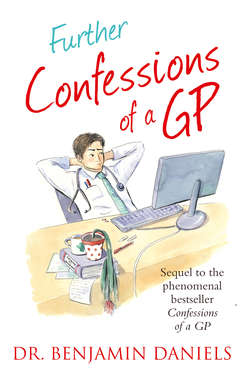Читать книгу Further Confessions of a GP - Benjamin Daniels - Страница 20
Glass test
ОглавлениеMy first experience of treating children was during my third year at medical school. It is at this time that we are allowed into the hospital to start seeing real-life patients. This is an exciting time for us as medical students, but there is always a fear that we will be asked difficult questions by a scary consultant on the ward round. This was the situation we found ourselves in as we started our first attachment to a paediatric department. Everyone had been very friendly up until now, but we had just started a ward round with Dr Bowskill. He was an odd man, most memorable for his 1970s side parting and very thick glasses with large brown frames. He looked more like an Open University physics lecturer than a doctor who needed to interact with small children and anxious parents.
My friend Jess and I were on his ward round and shuffled along behind him as he mumbled incoherently to the parents of the various children on the ward. We were mostly ignored until we reached the bed of a young boy with a rash.
‘Now medical students, this boy has a rash,’ he declared excitedly and then peered closely at the boy’s skin through his jam jar-sized lenses. ‘Fortunately for him this isn’t a meningitis rash, but what test might we use to see if it was?’
Dr Bowskill turned to Jess.
This is easy, I thought. Everyone has heard of the glass test. I was sure Jess would know how to hold a glass against the skin to see if the rash disappeared under pressure. Unfortunately, it was becoming apparent that she hadn’t ever heard of the glass test. Her expression was completely blank and she clearly didn’t have a clue how to answer Dr Bowskill’s question.
Rather than put Jess out of her misery or turn to me for the answer, Dr Bowskill just kept staring at her in silence. This silence just kept going and going and going, but Jess’s expression continued to remain completely blank. Come on Jess. I was trying to transmit the answer into her brain using telepathy, willing to try anything to end this excruciatingly awkward silence. If she’d just looked up at me I could have mouthed the answer but she just continued to stare vacantly at the small red spots on the boy’s arm.
After what seemed like an eternity, Dr Bowskill took off his glasses and handed them to Jess with great dramatic intent. ‘Perhaps these might help?’ he suggested in a loud, patronising voice.
Jess took the pair of glasses in her hand and I was sure she would click that she just had to hold the glass lens of his spectacles against the rash on the boy’s skin and end this whole tortuous affair. But Jess continued to look just as vacuous, holding those glasses in her hand. I could see her getting increasingly desperate.In a final moment of panic she put the spectacles on her nose and peered closely at the boy’s arm. She then looked up, shook her head and said, ‘Nope, still don’t know.’
At this point I absolutely fell about laughing. The painful awkwardness of the long silence accompanied by the hilarious sight of Jess wearing these ridiculous old-fashioned glasses was just too much for me to bear. Jess started laughing as well, still absolutely clueless of the relevance of the glasses to the whole meningitis diagnosis but aware that putting them on her nose in case she might be able to see the rash better had clearly not been Dr Bowskill’s intention. Particularly as the strength of the lenses meant that she could see practically nothing at all.
